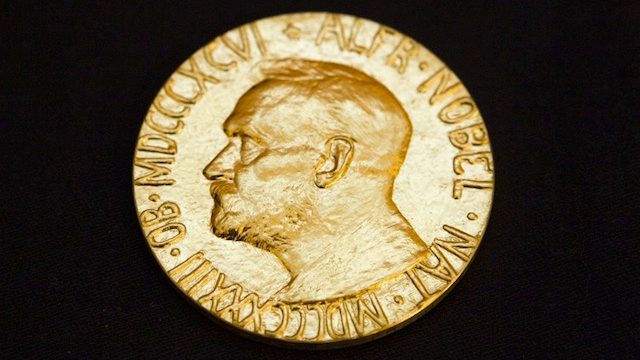SUMMARY
This is AI generated summarization, which may have errors. For context, always refer to the full article.

STOCKHOLM, Sweden – Nobel season opens with speculation rife over fugitive US intelligence leaker Edward Snowden’s prospects for the peace prize and whether the first award announced Monday, October 6 – the medicine prize – could go to research into chili, heat and pain.
US physiologist David Julius has been touted by Sweden’s leading daily Dagens Nyheter to win the medicine prize for discovering that pain receptors have the same reaction to pain, temperature and the spicy component of chili.
“David Julius’s discoveries have given us a much deeper understanding of how feeling works and completely new possibilities to produce drugs against chronic pain,” Maria Gunther, science editor at the paper wrote.
While the Nobel week begins with three science prizes – including physics on Tuesday, October 7, and chemistry on Wednesday, October 8 – most of the speculation surround the coveted peace prize to be announced Friday, October 10.

FULL COVERAGE: NOBEL SEASON 2014
Physiology/Medicine | Physics | Chemistry | Peace | Economic Sciences | Literature
This year’s peace prize has drawn a record 278 nominations, including that for Snowden – whose name was put forward by two Norwegian lawmakers for his exposure of widespread US electronic surveillance.
Snowden analyst would be a controversial choice as “many continue to see him as a traitor and a criminal”, according to Kristian Berg Harpviken, director of the peace research institute Oslo (PRIO), one of few analysts to publish a list of potential winners.
Nonetheless the five members of the Nobel Committee could still give him the award to “underline the independence of the Nobel Committee” from the Norwegian and US authorities, according to Nobeliana.com, a website run by leading Norwegian Nobel historians.
Too controversial
Others have rubbished the Snowden speculation.
“Judging from the past, I can’t see that coming. It’s too controversial – and Scandinavians are too fond of the (United) States,” Robert Haardh, head of Stockholm-based Civil Rights Defenders told Agence France-Presse.
Pope Francis – topping bookmaker Paddy Power’s list with 9/4 odds – would be another controversial choice.
“Pope Francis has brought attention to the fate of the poor, and the need for a new approach to development and economic redistribution,” according to PRIO’s Harpviken.
But critics argue that a Nobel for the pope would cause a similar outcry to President Barack Obama’s 2009 Nobel – less than a year into his presidency – which drew complaints that he was awarded for potential good deeds in the future rather than anything he had achieved.
Other favorites, also tipped last year, were 17-year-old Malala Yousafzai, the Pakistani activist for girls’ right to education and Congolese doctor Denis Mukwege.
While analysts believe the conflicts in the Middle East and Ukraine do not easily lend themselves to a peace prize, the Nobel Committee could choose to promote international security cooperation as it did with last year’s award to the chemical weapons watchdog OPCW.
“What we badly need at the moment is the re-evaluation of multilateral cooperation,” Ian Anthony, head of the Stockholm peace research institute, SIPRI, told Agence France-Presse.
Awarding a group like the Organization for Security and Cooperation in Europe (OSCE) could, “focus people’s thinking” on how to solve conflicts like the one raging in Ukraine, he said.
‘It makes scientists heroes’
Before getting to the peace prize, it is scientists who will be first in focus.
Nobel season is one of those few occasions in the year when scientists are in the media spotlight, said Sven Lidin, head of the Nobel Committee of Chemistry.
“It makes scientists heroes. It puts science on the agenda, and for a few days when the prizes are being announced and during the ceremony, the scientists are like rock stars, which is fantastic,” he told Agence France-Presse.
“It makes scientists heroes. It puts science on the agenda, and for a few days when the prizes are being announced and during the ceremony, the scientists are like rock stars, which is fantastic.”
– Sven Lidin, head of the Nobel Committee of Chemistry
Among those predicted to take home the physics prize are professors Charles Kane and Shoucheng Zhang from the US and Laurens Molenkamp from the Netherlands.
The trio are Dagens Nyheter’s bet for the prize for their work on new form of material, known as topological insulators, with potential real-life implications for computing.
Swedish public radio’s science department meanwhile believes that Swedish evolutionary geneticist Svante Paabo could be a contender for the chemistry prize for his work on Neanderthal DNA along with US geneticist Craig Venter, one of the first to map the human genome.
Africa’s turn?
As for the literature prize, which is expected to be announced on Thursday, October 9, Japanese author Haruki Murakami is once again the bookmakers’ favorite – with Ladbrokes offering odds of 5/1.
But literary critics are less confident about his chances.
“Murakami is probably a readers’ favorite and certainly popular with many journalists but he lacks that extra depth,” said Elise Karlsson, literary critic with Swedish daily Svenska Dagbladet.
With just four African literature laureates since the prize began in 1901, Kenyan author Ngugi wa Thiong’o and Algerian writer Assia Djebar are strong favorites among critics.
The economics prize – traditionally dominated by Americans – will wrap up the Nobel season on October 13.
Laureates will receive eight million Swedish kronor ($1.11 million, 878,000 euros) per award. – Rappler.com
Add a comment
How does this make you feel?
There are no comments yet. Add your comment to start the conversation.